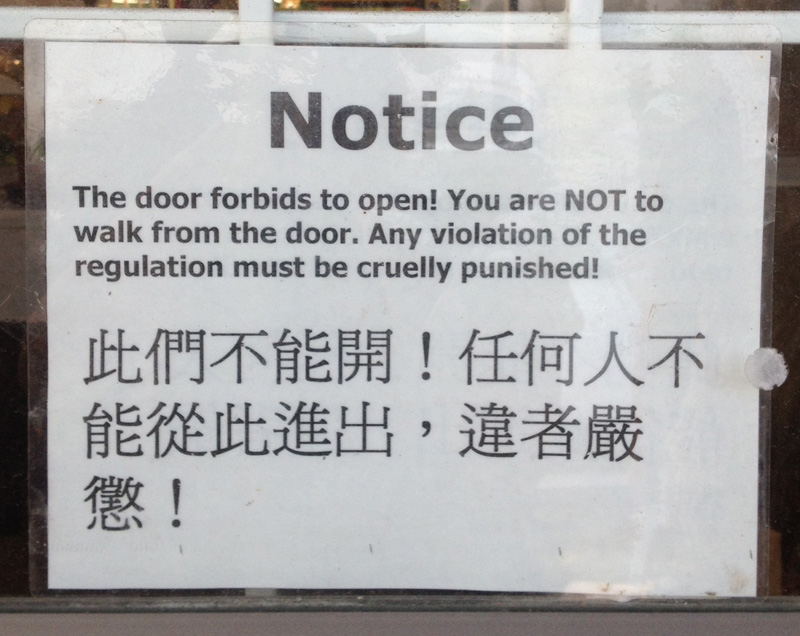The door forbids to open!
« previous post | next post »
Toni Tan spotted he following warning on a door in Toronto on Memorial Day weekend:
The inelegantly worded Chinese sign reads thus:
Cǐ mén bùnéng kāi! Rènhé rén bùnéng cóng cǐ jìnchū, wéizhě yánchéng!
此門不能開!任何人不能從 此進出,違者嚴懲!
"This door cannot be opened! No one can go in or out through this door. Offenders will be severely punished!"
The affectation and pomposity of the sign are enhanced through the use of the classical demonstrative adjective cǐ 此 (twice) instead of the vernacular zhè 這, the peremptory rènhé rén 任何人 instead of the more casual, informal shuí dōu 谁都, the imperative punctuation, and so forth.
In short, this is a fine specimen of Chinglish captured in North America.

Bruce Rusk said,
June 8, 2012 @ 2:18 pm
Is it possible to spot this "in Toronto on Memorial Day weekend," given that there is no Memorial Day in Ontario?
Freddy Hill said,
June 8, 2012 @ 2:22 pm
The door forbids me from opening it. Some other indeterminate power keeps me from walking from it. The cruel punishment must consist in me starving in front of it. It makes sense.
bulbul said,
June 8, 2012 @ 2:24 pm
Is it just me or does the sign really use the 'men' character (plural suffix) instead of the 'mén' character ('door')? That would add a nice twist to the pomposity of 此 :)
bulbul said,
June 8, 2012 @ 3:30 pm
Bruce,
24th on December may be just another winter's day in Riyad, but by Jove, if I'm there, it's Christmas Eve no matter what.
Victor Mair said,
June 8, 2012 @ 5:45 pm
@bulbul
A++ for you!!!
1. They really did use the plural suffix (men 們) for "door" (mén 門).
2. Toni Tan lives in America, so — even though she spotted the sign in Canada — it was still Memorial Day for her.
un malpaso said,
June 8, 2012 @ 8:30 pm
Clearly, here is a door it would be best to avoid altogether, since every possible prepositional relation to it seems to be highly forbidden. I wonder if I am violating a rule by even thinking about it.
Chad Nilep said,
June 8, 2012 @ 9:45 pm
The sign combines awkward-but-understandable English with awkward-but-understandable Chinese. I wonder if the sign writer was a speaker of some third language.
Michael W said,
June 8, 2012 @ 11:24 pm
I see Kafka's parable "Before the Law" has now been translated into Chinese.
Is there any chance the odd Chinese is somehow more normal for use by some immigrant population in Toronto?
Duncan said,
June 12, 2012 @ 12:32 am
Quoting V Mair:
"Toni Tan lives in America, so — even though she spotted the sign in Canada — it was still Memorial Day for her."
What, so Canada isn't in America now?
Too lazy to look it up now, but might there be an LL entry on that?
Duncan (who happens to live in the United States of America and is in fact native USian, but still knows that people living in it's neighbors Canada and Mexico, and for that matter a quite a few nations south of Mexico as well, are "living in America")
David Walker said,
June 12, 2012 @ 11:22 am
Reminds me of the sign: "This door must remain closed at all times".
Then why not just sheetrock over the door, since it doesn't need to be opened, ever?
Any use of that sign is weird to me.
I sure wouldn't want to spot the door that's the subject of this post, since I couldn't open it or walk away… yes, I would have to stand there and starve!
David Brown said,
June 15, 2012 @ 8:25 am
Duncan,
David (who happens to live in Canada), knows no Canadian who considers themselves "living in America". Yes, we live in the geographical space "North America", but the term "America" has always to me, and everyone I know, meant "The United States of America". "America" and "Canada" are used as political terms and refer to citizenship, not geographical location. I certainly don't think of myself in terms of geographical location – I think of myself in terms of political citizenship.
I lived for a time in Czechoslovakia (before the split) and had this very discussion with a Slovak. He claimed, "You live in North America, so you are an American!". I replied, "You live in Czechoslovakia, so you are a Czech." He pondered for a moment (Slovaks hate being thought of as Czech), and replied, "OK, I understand."
Grant said,
July 10, 2012 @ 9:54 pm
I imagine that 們 was used instead of 門 because this door will have many 人 standing next to it, unable to advance for fear of cruel punishment.
Otherwise, I don't find the Chinese awkward at all. Simple written Chinese, not pompous to my eye.